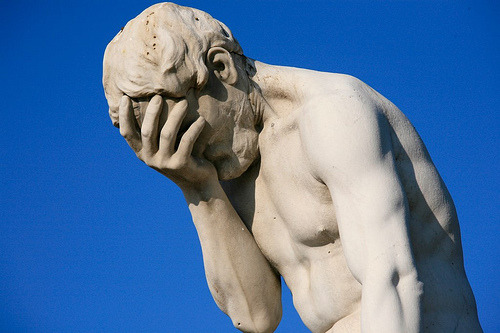Guest columnist James Chin is a professional poker player who has previously written about flow, having the courage to change, and the truth about success. In this post, he examines how best to dust yourself off and try again.

The feeling of failure sucks.
Failure demotivates and saps the energy of even the most confident of people, especially if they’re not receiving some sort of positive feedback from their day.
It’s an old relationship cliche that you should never go to bed upset with your significant other. Waking up upset the next day just serves to reinforce negative feelings you have between each other. Use this advice in your relationship to yourself.
I’ve come up with a way to make sure I don’t get too down and can bounce back sooner than later. It’s simple: take time to create that positive feedback. You’ll be much more likely to wake up the next day motivated and ready to be productive and tackle whatever life may throw at you. Here’s how:
Step 1: Take time to analyze your losses.
Remember to pause after the errors and trials of the day.
Errors are mistakes you make, poor decisions that you’d change if given a second chance.
Trials are more nuanced. They’re poor results from good decisions that you’ve made that still feel like errors, but given a second chance, you’d make the same choice. For example, if I see an open Michael Jordan under the hoop, then I should pass it to him, because 99.9% of the time, he’s going to put it into the basket when he’s that close. But if for some reason, he misses the dunk, that doesn’t invalidate the original correct decision to pass it to him. It wasn’t an error, it was just a bad result.
As a poker player, I have losing sessions. But those losing sessions don’t really feel like failures unless I let the losses negatively affect my play in my next session. For instance, in obsessing over a genuine error like a stupid bluff that wouldn’t have worked in a million years, I miss opportunities in the present to make the correct move.
Other times, I obsess over poor results. Logically, I know that a poor outcome may just be a trial I have to get through in order to make the same play later, but emotionally, losing in spots where I should have won can take a toll. If I fail to pull the trigger on a bluff that would work most of the time just because it didn’t work the previous time, then I’ve become too loss-averse and I’m not playing to the best of my ability.
When I notice either of these things happening, I have to remind myself to take a break in order to de-stress and move onto step 2.
Step 2: Create positive feedback!
Surprisingly, reframing your reaction to errors and trials to one of gratitude can be one of the most useful forms of positive feedback.
It’s been shown that the use of gratitude journals — where people write down three things they were grateful for every day — increased happiness, personal growth, and ability to cope with the difficulties that life threw at them. We can flip our failures into strengths if we can learn from them.
Be grateful for your errors because errors provide insight. Be grateful for your trials because you’re still in the game and have more chances to make the better decision again and get rewarded.
In poker, if my opponent is going to call my bluffs in a certain spot, then I’m going to stop bluffing, but at the same time, that means the reverse — a value bet with a real hand in the same situation — is brilliant. Instead of obsessing over the stupidity of my initial error, I can be grateful that I’ve found a spot to restructure my game for value.
And as long as I’m practicing proper bankroll management so that a single bad result doesn’t mean complete disaster, poor results from bad beats is no cause for concern. It’s to be celebrated because I’m putting my money in with the best of it, and in the long run, it’s how I make money.
Carrying over a feeling of failure from one day to the next is a recipe for a string of non-productive days. So make sure to end the day not feeling like it was lost.
Instead, take the time to be grateful to your past self for making errors you can learn from and for having the strength to carry on through trials so that your future self has a fighting chance to do better tomorrow. You’re still in the game, and that’s something to be thankful for.
Liked this guest post? Subscribe to our free newsletter for more great content on productivity, success, and how to work better!
Images: Alex Proimos/Flickr
